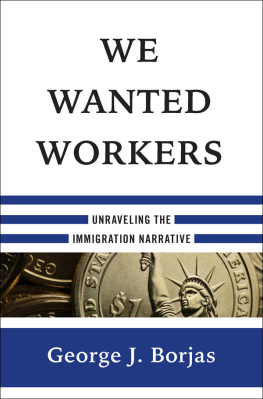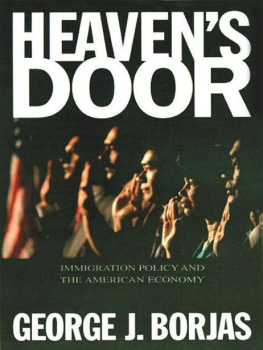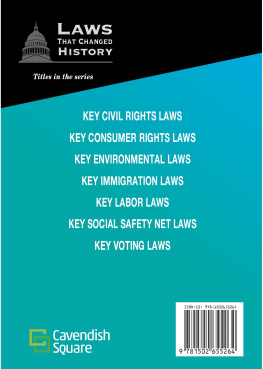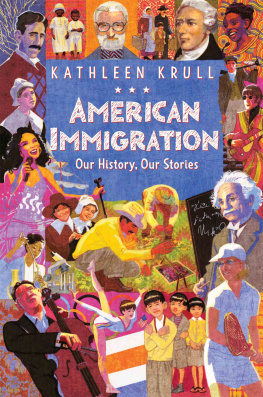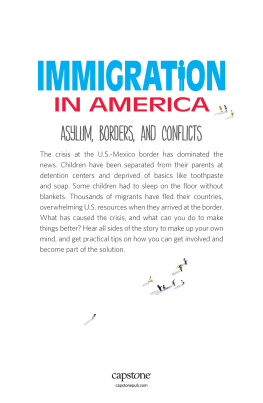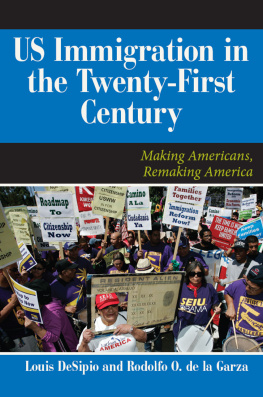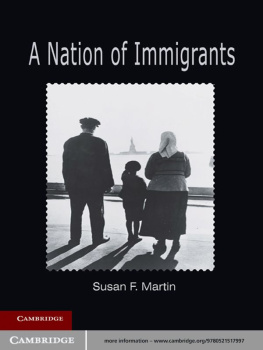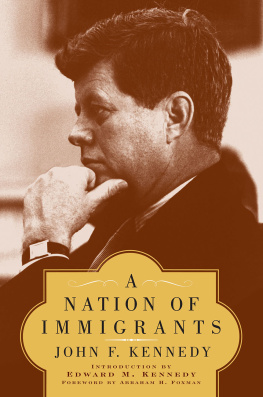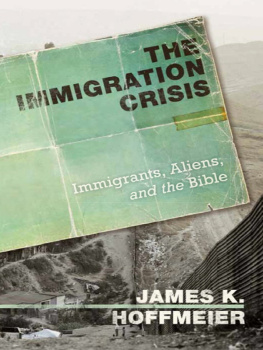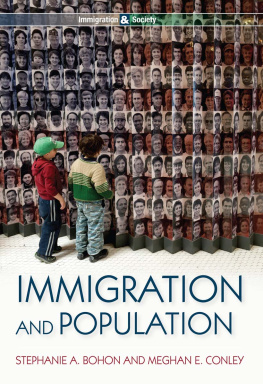
TO JANE
Contents
WE WANTED
WORKERS
T HE PAST FEW decades have witnessed a historic integration of the United States into the world economyeven more so than in the first half of the twentieth century. This integration, an important element of the worldwide process of globalization, was marked by a rapid increase in the quantity of goods traded with other countries and in the number of people who immigrated to the United States. Between 1970 and 2015, the value of exports and imports as a fraction of gross domestic product (GDP) almost tripled from 11 percent to about 30 percent. The foreign-born share in our workforce tripled as well, from 5 percent to over 16 percent.
Not surprisingly, immigration and international trade have much in common. Both involve the movement of something across national boundaries. In the case of trade, manufactured goods are shipped from one country to another. In the case of immigration, persons themselves move across those boundaries.
It is easy to think of the international flow of goods as a kind of immigration. Consider what it means to import a proverbial widget. That widget did not create itself out of thin air. It was manufactured by a combination of physical resources and some labor. Making a single widget in China may require a high-skill worker to spend six months doing the design work and two low-skill workers to spend a full year molding a shapeless piece of metal into a desirable object. In a sense, importing a Chinese-made widget resembles the immigration of a high-skill Chinese worker for half a year, and the immigration of two low-skill Chinese workers for a full year. Put differently, immigration seems like trade, except that instead of importing the finished widget, we are importing the raw labor that can manufacture that widget domestically.
This equivalence between the international movement of workers and the international movement of goods influences the way in which many of us think about immigration. Countries might want to fill specific labor needs to produce things that the indigenous population desires, and immigrants provide the raw labor inputs that can be moved around from place to place to fill those needs. We often hear that the United States needs low-skill workers to harvest its lettuce and mow its lawns, and high-skill workers to write its software and teach at its universities. An almost infinite number of foreign-born low-skill workers is available to fill those low-skill job openings, and many high-skill workers seem willing to move to write code and teach.
Within this very myopic perspective, immigrants fill the labor slots that need filling, and those foreign-born workers play no other role in our countrys cultural, political, social, or economic life. Our childrens schools are unaffected, the welfare state is untouched, the balance of political power is unchanged, and daily life in our neighborhoods continues as before.
The accumulated knowledge from decades of research implies that international trade, on the whole, can have very beneficial impacts on the US economy, creating an instinctive bias toward viewing this type of worker migration favorably. We already know that international trade is beneficial for many. Therefore, the argument goes, admitting the much-needed foreign-born workers to fill the production slots must also be beneficial. After all, importing workers seems equivalent to importing widgets.
In the 1950s, this perspective led West Germany (and other European countries) to actively recruit and import hundreds of thousands of guest workers from Turkey and elsewhere. The guest workers were expected to be widget makers and nothing more. In other words, West Germany viewed those workers as the raw labor underlying the economic argument that immigration, like trade, must be beneficial. They were not considered to be part of Germany in any cultural or civic sense, and the German-born children of those widget makers were not even entitled to become German citizens until the 1990s. In the short term, the imported workers performed their assigned task: they produced widgets, and they produced them efficiently and by the millions. The contribution of those guest workers to the West German economy was likely an important factor in the postwar German economic miracle.
However, the presumed economic gains that result from looking at the world through the myopic lens of immigrants as a collection of robotic workers often clash with reality when we view immigration from a much broader and longer-term perspective. Over time, the impact of the temporary workers who would come in for a year or two to fill slots in the assembly line was not simply the sum of their contribution to widget production. By 2011, Turkish immigrants and their children comprised almost 4 percent of the German population, and the question of how the immigrants and their descendants fit into German society had become a central policy concern there. Reflecting on the European experience with the millions of guest workers, the Swiss playwright and novelist Max Frisch made perhaps the single most insightful observation about immigration when he quipped: We wanted workers, but we got people instead.
One underlying theme of this book is that viewing immigrants as purely a collection of labor inputs leads to a very misleading appraisal of what immigration is about, and gives an incomplete picture of the economic impact of immigration. Because immigrants are not just workers, but people as well, calculating the actual impact of immigration requires that we take into account that immigrants act in particular ways because some actions are more beneficial than others. Those choices, in turn, have repercussions and unintended consequences that can magnify or shrink the beneficial impact of immigration that comes from the contribution to widget production.
For instance, it is self-evident that not every person in a sending country wants to be an emigrant. People often choose to stay in their place of birth, despite the sizable economic gains to be had by moving from one place to another. The movers almost certainly differ in significant ways from the stayers; they have different motivations, different capabilities, and so on. To calculate the impact of immigration correctly, it is not just a matter of counting the number of bodies that filled the slots in the proverbial widget factory. We also need to worry about which types of persons the receiving country ended up attracting. It would not be surprising if a receiving country, channeling Max Frischs observation through Obi-Wan Kenobi, concluded that perhaps those were not the workers we were looking for.
Once the immigrants settle in their destination, they have many more choices to make. If immigration were simply the process of placing workers along the assembly line, we would not need to worry about the assimilation prospects of the immigrant population. The workers fill the factory slots, and it does not matter much whether they learn the language and embrace the cultural, social, and political norms of their new homes.
However, immigrants are people, and people make choices. A crucial choice that all immigrants must make is whether to assimilate into their new surroundings. As Europe is learning, assimilation does not happen automatically, and a large unassimilated population presents many challenges. From an immigrants point of view, assimilation has many benefits; for example, an immigrant may find better-paying jobs. But there are also many costs; for example, an immigrant has to devote time to learning the new language, or may have to give up long-held cultural traits and beliefs. Immigrants are more likely to assimilate when conditions on the ground make it in their best interest to do so.
Next page
